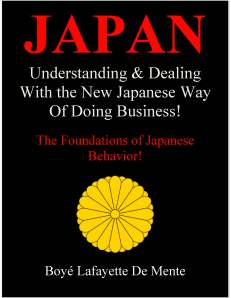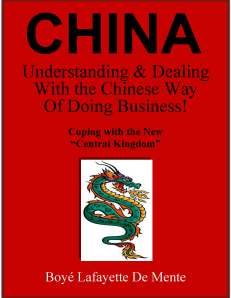The Incredible Power of Serendipity – Highlights of an Uncommon Life
How Serendipity Shaped the Life of Author Boyé Lafayette De Mente
This is the personal memoir of author Boyé Lafayette De Mente, the 4th of ten children born to poor parents in an isolated valley in the Ozark Hills of southeast Missouri, and raised during the Great Depression of the 1930s.
He went on to have a remarkable life which he attributes to the incredible power of serendipity.
As editor of The IMPORTER magazine in Tokyo in the late 1950s and early 1960s and as the author of numerous pioneer books on the mindset and business practices of the Chinese, Japanese and South Koreans he made major contributions to the initial rise of Japan, South Korea, Taiwan, Hong Kong and China as economic superpowers.
He played a leading role in helping to launch the career of Thunderbird School of Global Management alumnae brother Merle Hinrichs who became the largest trade magazine publisher in Asia, a major financial donor to Thunderbird and member of the board of directors.
And he launched the publishing career of Kentucky hillbilly Larry Flynt who achieved great wealth and notoriety as the publisher of HUSTLER magazine and champion of freedom of speech. [On the day De Mente met Flynt he told his wife that he had just met a 26-year old man who had the intelligence and drive to become president of the United States by the time he was old enough to qualify for the office.]
De Mente’s encounters and relationships with such extraordinary individuals as Admiral Chester W. Nimitz, America’s ranking naval officer during World War II; Akio Morita, co-founder and leading light of what was to become the Sony empire; Toshio Karita, former protocol officer for the Imperial Family of Japan; and Daisetzu Suzuki, Japan’s leading Zen master, plus many more, were experiences he could not have even dreamed about before they happened.
His story is an example of the potential of ordinary individuals to achieve significant things when life presents opportunities and they follow up on them.
_________________________________________
Boyé Lafayette De Mente has been involved with Asia since the late 1940s as a member of a U.S. intelligence agency, journalist and editor. He is a graduate of Jōchi University in Tokyo, Japan and Thunderbird School of Global Management in Glendale, Arizona, USA. In addition to books on the business practices, social behavior and languages of China, Japan, Korea and Mexico he has written extensively about the plague of male dominance and the moral collapse of the U.S. and the Western world in general. Recent books include: CHINA Understanding & Dealing with the Chinese Way of Doing Business; JAPAN Understanding & Dealing with the NEW Japanese Way of Doing Business; AMERICA’S FAMOUS HOPI INDIANS; ARIZONA’S LORDS OF THE LAND [the Navajos] and SPEAK JAPANESE TODAY – A Little Language Goes a Long Way! To see a full list of his 60-plus books go to: www.authorsonlinebookshop.com. All of his titles are available from Amazon.com.
Finding China’s “Back Doors” Key to Business and Political Success!
Boyé Lafayette De Mente
BEIJING—In China where personal connections play a paramount role in all relationships—business, personal and political—the typical Western way of doing things is often ineffective, and may be considered both arrogant and rude.
Historically ordinary Chinese had no inalienable rights to protect them from those in power. Bureaucracy was universal and honed to perfection, and expecting something simply because it was “right” and you should get it, and especially “demanding” something or some action, would virtually always result in doors being slammed in your face—or far more serious results.
This situation resulted in the Chinese, including government officials, having to develop a variety of strategies and tactics to get things done—ways that were unofficial but were a key part of the system—like authorities allowing a black market to function because it provided them with advantages of one kind or another, including keeping the level of frustration in the population below the point of eruption.
After the Communist Party came to power in China in 1949 and instituted a number of democratic principles and polices—including giving women the right to vote—the policy of both allowing and promoting unofficial processes remained virtually unchanged, both because it was so deeply embedded in the culture and because it continued to serve the interests of the government.
The most common of these unofficial practices was using the hou men (hoe-uu mane) or “back door”—that is, contacting and making deals with people behind-the-scenes, in private settings, making them fait accompli on the QT.
Despite political reforms and cultural changes that have made life in China far more open, rational and practical, the use of hou men remains a vital part of the conduct of business, national politics and international relationships.
When there is a “back door” most Chinese will automatically take it—and if there isn’t one they will generally attempt to make one, because that is almost always the fastest and most efficient way of getting official as well as unofficial things done.
In simple terms, these “back doors” are people who can get things done because of their power positions or because they can call on their personal relationships with others to bypass bureaucracy, official policies and often laws as well.
Obviously, this aspect of personal as well public behavior is a factor in all cultures, but in China the hou men element functions as an integral part of business and politics, without which the official social, economic and political systems would not work well enough to sustain themselves.
Until foreigners who are newly arrived in China learn about the existence of hou men and develop skill in making and using them their chances of success are slim.
In fact, it pays to start building “back door” connections before you set foot in China—developing contacts and getting introductions through the overseas offices of Chinese companies, chambers of commerce, banks, cultural organizations, university professors, such clubs as Kiwanis, and so on.
_________________________________________
Boyé Lafayette De Mente has been involved with Asia since the late 1940s as a member of a U.S. intelligence agency, journalist and editor. He is a graduate of Jōchi University in Tokyo, Japan and Thunderbird School of Global Management in Glendale, Arizona, USA. In addition to books on the business practices, social behavior and languages of China, Japan, Korea and Mexico he has written extensively about the moral collapse of the U.S. along with books on his home state of Arizona. To see a full list of his books go to: www.authorsonlinebookshop.com. Recent books include: CHINA Understanding & Dealing with the Chinese Way of Doing Business; JAPAN Understanding & Dealing with the NEW Japanese Way of Doing Business; AMERICA’S FAMOUS HOPI INDIANS; ARIZONA’S LORDS OF THE LAND [the Navajos] and SPEAK JAPANESE TODAY – A Little Language Goes a Long Way!






